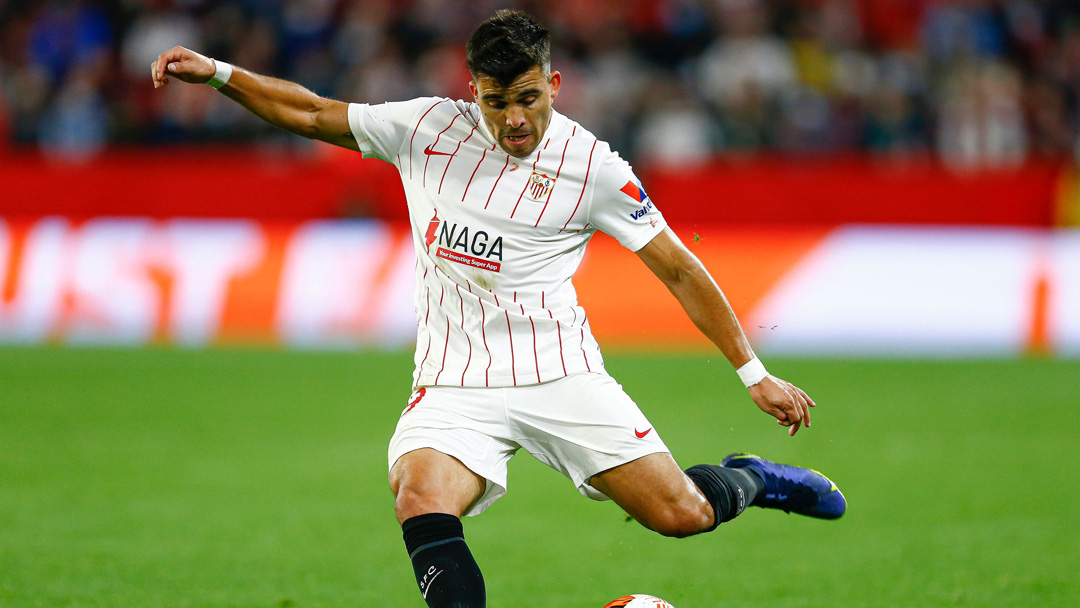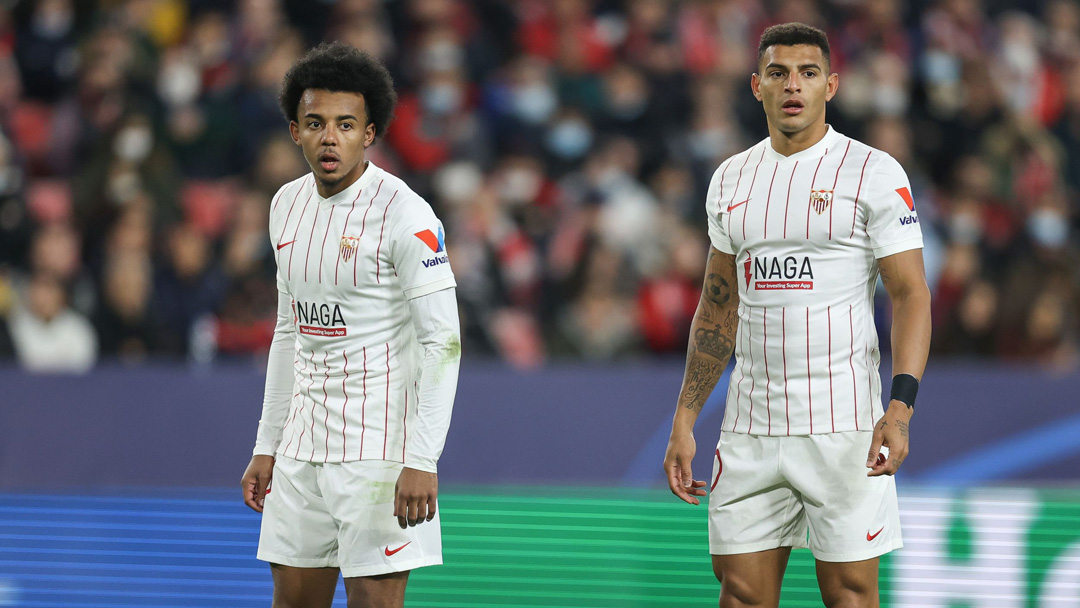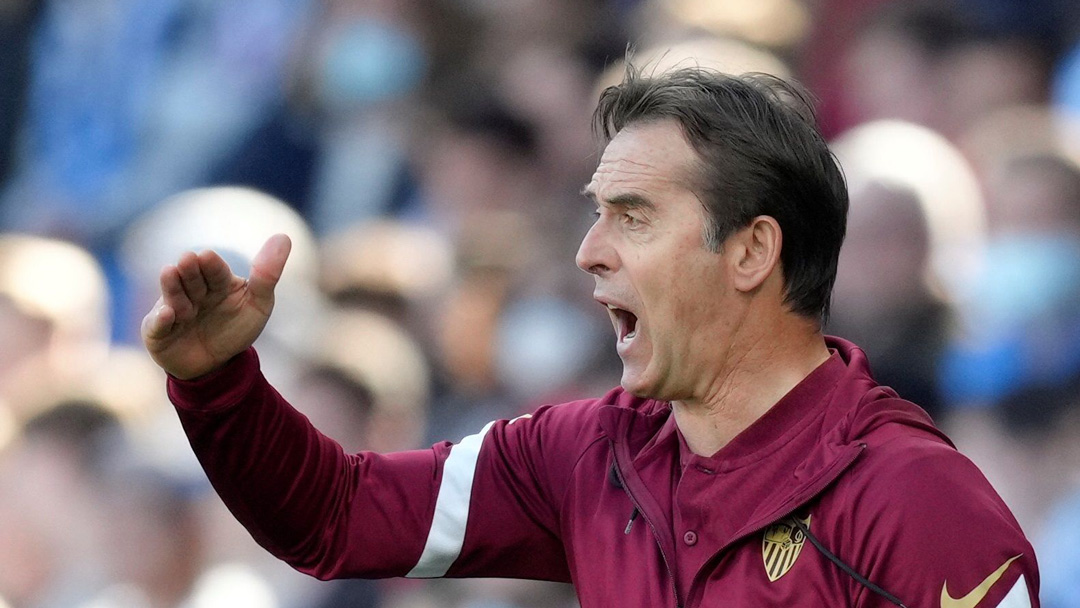In the second of two preview articles ahead of Thursday's UEFA Europa League round of 16 second leg, Spain-based football writer Simon Hart, who covered the first leg for UEFA.com, shares his in-depth assessment of Julen Lopetegui’s Sevilla...
If this season unfolds as sevillistas would wish, then tonight’s match at the London Stadium will be one of 30 on the road in all for Julen Lopetegui’s team in 2021/22 – a road that would lead, moreover, right back to their own Sánchez-Pizjuán Stadium for May’s Europa League final.
If it sounds ambitious, that is just the way it is these days for the six-times UEFA Cup/Europa League winners. Now in their third season under the 55-year-old Lopetegui, La Liga’s second-placed team have shrugged off injuries and absences to push Real Madrid harder than any other side this season. And if their December exit from the UEFA Champions League was a setback, the prospect of a Europa League final at their home stadium on Wednesday 18 May is an exciting challenge for a team on a positive trajectory ever since Lopetegui arrived in the Andalusian capital in the summer of 2019.
Sevilla had finished sixth in La Liga with 59 points the season before. They ended his first campaign, 2019/20, in fourth position with 70 points and won the Europa League, with victories over Roma, Manchester United and Inter Milan along the way. Last term they finished fourth once more, with a points haul of 77 which was a record for a club whose only league title, in 1946, came at the end of a 26-game campaign.
This upwards curve is testament to the efforts of Lopetegui, who landed in Seville following a bruising 2018 in which he lost high-profile jobs with first Spain’s national team and then Real Madrid. His time in the latter post had begun amid controversy after it was announced he would become Madrid’s new coach as he was still preparing for the 2018 FIFA World Cup with Spain – indeed just 72 hours before their opening game. The Royal Spanish Football Federation sacked him a day later. There would be no World Cup and there would be no patience shown to him at the Santiago Bernabéu where, after just ten league games, he lost his job on 29 October. Yet he has bounced back impressively in Seville, showing the coaching acumen that he had displayed in guiding Spain’s junior sides to European titles at U19 and U20 levels before leaving to coach Porto in 2014.

In Seville, he has built a side with La Liga’s best defensive record. Lopetegui was himself a goalkeeper – he had spells at both Real Madrid and Barcelona, albeit most of his top-flight appearances came with Logroñes and Rayo Vallecano – and in Morocco international Yassine Bounou, aka Bono, he has one of Spanish football’s best goalkeepers – evidenced, for instance, by his brilliant double save in the first leg against Dinamo Zagreb in the last round.
Lopetegui can also call on an excellent central defensive pairing in Diego Carlos and Jules Koundé. The former is arguably Sevilla’s most important player this season and it underscored the club’s ambitions that they rejected an offer from Newcastle United for the powerful Brazilian in the January transfer window. They had done the same last summer when Chelsea bid for Koundé, a player who loves to roam forward from the back, and Monchi, Sevilla’s sporting director, considers that the two together rank among the top ten pairings in Europe. The statistics back him up as, at the time of writing, Sevilla have conceded just 18 goals in 27 league fixtures.
From an offensive perspective, Lopetegui likes full-backs who get forward. Jesús Navas and Marcos Acuña – the Argentininan left-back whose robust physique (and dead-ball ability) might stir memories of Julian Dicks – look to provide a stream of crosses. Both were ranked among the top six players in the Champions League group stage for most crosses from open play and it was Acuña’s ball that led to Munir’s winning goal in the first leg last week. Navas, a world champion with Spain in 2010 and later twice a Premier League winner with Manchester City, is now 36 and missed three months of the season with a muscle injury but returned against Dinamo Zagreb in the last round.
Sevilla have another Man City old boy in Fernando who, at 34, remains hugely influential for his reading of the game from a deep midfield position. With the vision and playmaking ability of fellow thirty-somethings Ivan Rakitić and Papu Gómez, there is no shortage of guile and, as we saw in last week’s first leg, there is also strength in depth. Some Spanish football watchers believe Sevilla have La Liga’s best squad this season and without any of the above midfielders they still performed impressively in that area last Thursday with Joan Jordán, usually a box-to-box player, excelling in a deeper role.

Sevilla’s style under Lopetegui is about keeping possession and controlling play. They have had less possession than their opponents in only one of nine European fixtures this season – and in that solitary exception, against Salzburg last September, they managed a 48% share.
That Salzburg game was perhaps more illustrative of the difficulties the Andalusians can encounter against opponents equipped to counterattack at high speed. In last season’s Champions League round of 16, Borussia Dortmund punished them with their swift attacking transitions, especially in Seville on a night when Erling Braut Haaland was in full one-man-wrecking-ball mode. Similarly in this season’s Champions League group stage, they had problems with the speed and energy of first Salzburg and then Lille, losing the control that they retain more readily amid the slower rhythms of the Spanish game.
That said, they came out on top of an unusually to-and-fro home leg in last month’s play-off against Dinamo Zagreb, winning 3-1 before a 1-0 loss in Croatia. A key figure, and scorer of their second goal, in the first leg was the hard-running Argentinian attacker Lucas Ocampos, a player pivotal for the penetration he brings down the flanks. Anthony Martial, the January loan signing from Man United, was on target too that night with his first goal for the club and Sevilla will hope he can stay injury-free throughout the spring.
Their other main centre-forward is last season’s top scorer, Youssef En-Nesyri. He reportedly entered West Ham United’s radar last summer but in a campaign interrupted by injuries and international duty has not scored since September. Indeed goalscoring, particularly away from home, has been their Achilles heel, their title prospects hampered by a tally of just 12 goals from 15 Liga away fixtures so far, which has meant too many draws. Indeed only once in their last 13 matches on the road have they scored more than a single goal – and that was at second-tier Real Zaragoza in the Copa del Rey. Lopetegui will hope for a change of luck on Thursday night.
*Click here to read part one of SImon Hart's preview, explaining why the UEFA Europa League has been the spark that has lit Sevilla over the past 15 years.

